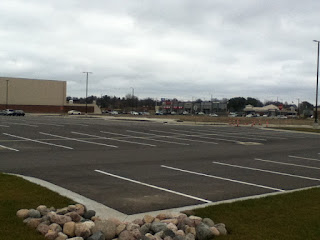 |
| Entrance to Westdale off 33rd Avenue... Decidedly unwalkable |
This year's Black Friday Parking walk reveals what taxpayers helped buy. While there is still ongoing construction, what remains on the site are stores but without the public features the mall used to offer: a place to walk (albeit one you had to drive to get to), a common area, public restrooms, and a warm place to wait for the bus. When the Super Wal-Mart is kicking your ass on walkability, you've got problems.
What also remains on site is parking. A lot of parking. J.C. Penney's was doing a brisk business Friday afternoon, but even so there was plenty of parking outside.
The parking lots of Westdale were at best 50 percent full. While it's true that the Black Friday phenomenon may be losing its commercial mojo, and that the highly popular University of Iowa Hawkeyes football team was playing archrival Nebraska this afternoon, it's fair to say that the new Westdale has vastly overbuilt parking. I don't know whether it's due to city requirements or the developer's choice, but either way there are civic costs to overloading the town with parking lots. Someone is on the hook for keeping them in repair, plowing them, &c. The adjoining streets are a dreadful mix of car traffic and unattractive shopping plazas full of chain stores and restaurants:
 |
| Edgewood Rd looking north from 29th Street |
 |
| Edgewood Road view of one of the plazas that comprise the new Westdale |
 |
| Near the store |
 |
| Farther out |
 |
| Plenty of parking at the strip mall next door |
Westdale Mall-That-Was sits on a triangle formed by three stroads that truly are traffic sewers: Edgewood Road, Wiley Boulevard and Williams Boulevard. That's a lot of accumulated bad planning, and a lot of surface parking, but now that's all water under the bridge. Those costs are sunk, that ship has sailed. It can't have been worth $11.7 million to polish it, but I'm pretty sure it's not worth trying to impose urbanism on it either. It should at least serve as an object lesson for future development: Let whatever you do be human-scaled, let it be walkable, and let development decisions rely on market mechanisms like price signals instead of how much pull a given developer has with the city government.
 |
| A cold-looking blogger waits for the bus. To quote our new state motto, "Suck it up, buttercup!" |
"Black Friday Parking," Strong Towns, 25 November 2016
Sarah Kobos, "Black Friday Proves We Have Too Damn Much Parking," Modern Cities, 23 November 2016,
B.A. Morelli, "'Open for Business,'" Cedar Rapids Gazette, 20 November 2016, 1A, 7A
LAST YEAR'S MODEL: "Black Friday Parking," 27 November 2016












